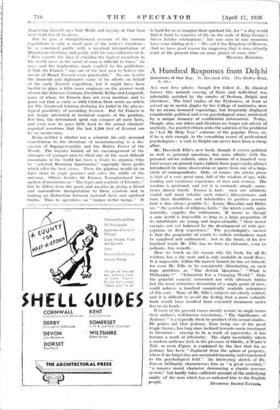A Hundred Responses from Delphi
ALL men love advice, though few follow it. In classical Greece this natural craving of State and individual was admirably satisfied by the oracles of Dodona, Delphi and elsewhere. The brief replies of the Pythoness, at least as served up in metric jingles by her College of assistants, were by no means bemused vapourings, but frequently displayed considerable political and even psychological sense, reinforced by a unique treasury of confidential information. Today, though, alas, our rulers and dictators no longer ask advice of anybody, the puzzled citizen seeks the solution of his problem in "Let Me Help You" columns of the popular Press, or if he is rich enough, in the consulting rooms of professional psychologists : a visit to Delphi can never have been a cheap affair.
Mr. Havelock Ellis's new book, though it covers political as well as personal questions, has some affinity- with the
personal advice column, since it consists of a hundred very . brief essays on general topics (about three pages each), always •
introduced by some observation or query from one of a large-1 circle of correspondents. Only, of course, the advice given is that of a very great man, full of the wisdom of age, wide reading and enormous experience of men and women. His wisdom is profound, and yet it is curiously simple, some- times almost Greek. Excess is bad ; men are infinitely varied and -must tolerate each other's idiosyncrasies and turn their disabilities and inferiOritieS- to positive account tbut is this always possible ?) ; Lenin, Mussolini and Hitler are " the symbols of religious faiths " for Which youth, quite naturally, supplies the enthusiast-a. It seems as though a sane world is impossible so long as a large proportion of its inhabitants are young arid impreastionable,- " their motor energies not yet • balanced by the development -of wide per- ceptions - or deep experience:" ' The PsychologiSt's answer is that the propensity- of youth to violent enthtisttism must be canalised and sublimated ; but in the limits of his few hundred words Mr. Ellis has no tithe to elaborate, even to
indicate, this reniedy. . . Here we touch on the reason why his book,- for alLits
wisdom,-has a dry taste and is only readable in small doses. It is impossible, within the narrow bounds he has set himself, for even- Mr. Ellis to be consistently illuminating on such huge „problems as ".The. Jewish Question," "What is Philosophy ?" "Education For a Changing World." Only - the graCeful essayist,• concerned not with ultimate truths but the most attractive decoration of a. single point- of -view, could achieve a! hundred consistently- readable miniatures of this sort. Many of Mr. Ellis's subjects are closely related,' and it is difficult to avoid the feeling that a more valtiable book would have resulted from extended treatment under five or six heads.
If most of the present essays merely restate in single terms their author's well-known convictions, " The Significance of Jealousy " is a typically fresh by-product of his sexual studies. He points out that jealousy, from being one of the great tragic themes, has long since inclined towards comic treatment in literature : ceasing to be a mark of' superiority, it has become a mark of inferiority. The slight incredulity which a modern audience feels in the presence of Othello, A Winter's Tale, or even Figaro, is explained by the fact that for us jealousy has been " displaced from the sphere of property, where it no longer has any acceptable meaning, and transferred to the psychological field." An interesting sketch of Dr. Jonson brilliantly characterises him as " a great eccentric," "a massive moral character dominating a chaotic nervous system," but hardly takes sufficient account of the underlying sanity of the man which has so endeared him to the English
DESMOND SIIAWE-TAYLCIR.












































 Previous page
Previous page